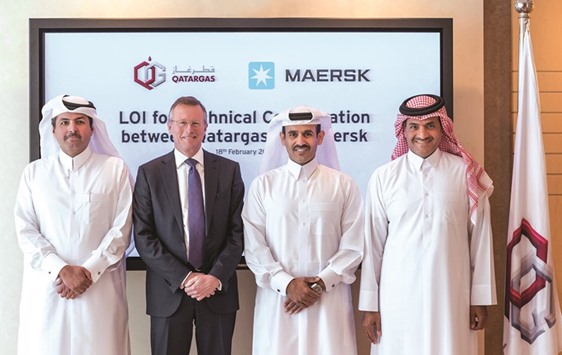Qatargas has signed a technical collaboration agreement with the Maersk Group to explore opportunities related to the use of LNG marine propulsion.
It is estimated that the use of LNG propulsion can lead to a potential reduction in CO2 emissions of 25% compared to the use of conventional shipping fuels.
The technical collaboration agreement, letter of intent between Qatargas and the Maersk Group, was signed by Qatargas chief executive officer Sheikh Khalid bin Khalifa al-Thani and Maersk Group chief executive officer Nils S Andersen in Doha recently.
In addition to the technical collaboration agreement, a second agreement, a memorandum of understanding was earlier signed among Qatargas, Maersk Line and Shell International Trading Middle East Limited to evaluate LNG as a marine fuel.
“Qatargas has a proven track record of technology innovations for the different uses for LNG. In an ever-changing industry, innovation becomes even more important to remain competitive. We look forward to pursuing this partnership with the Maersk Group, in order to explore new or improved technology for Qatar’s LNG carriers and at the same time being able to contribute to the development of alternative cleaner fuel technology for vessel operators,” Sheikh Khalid said.
Maersk Line currently operates more than one in six of the world’s container vessels. Subject to the required infrastructure being made available and the development of cost-efficient LNG propelled vessels, early predictions suggest a larger scale use of this propulsion technology by ship owners in the future.
Among their many innovations, Maersk has developed an on-board lubrication oil system to recycle used lubricants, resulting in savings while maintaining safe, reliable and optimised engine conditions.
“This cooperation between Qatargas and the Maersk Group represents an important step in developing technology to use LNG as a viable fuel for maritime transportation. The possible use of LNG propulsion technology for ships presents an opportunity to reduce both SOx emissions and to reduce the transport sectors CO2 footprint,” Andersen said.
Qatargas, the world’s largest LNG exporter, and the Maersk Group have been exploring opportunities for collaboration related to LNG marine propulsion technology for the last two years.
LNG has the potential to further reduce emissions from shipping of carbon dioxide (CO2) by up to 25%; of nitrous oxide (NOx) by up to 40%; and to completely eliminate sulphur oxide (SOx) emissions.

Sheikh Faisal, Maersk Oil Qatar deputy managing director; Andersen; Saad Sherida al-Kaabi, QP president & CEO and chairman of Qatargas board of directors; and Sheikh Khalid after signing the letter of intent.
